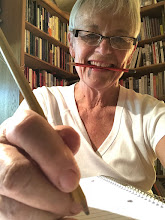In 1967 while in college, I spent a week babysitting for four kids. After putting the kids to bed the first night, I found a book on the couple's bookshelf that I'd heard about, In Cold Blood by Truman Capote. For the next five evenings, I'd put the kids to bed and read until after midnight. I was so terrified reading this book that one night I locked myself in the upstairs bathroom after making sure that every door and window downstairs was locked first. I'd never read anything like In Cold Blood which was a non-fiction novel, one of the first or maybe the first.
Capote's book made him famous and some believe that in writing it, he "invented" a genre. Sometimes called literary journalism and at other times called creative non-fiction or the literature of reality, this genre combines heavy research with unapologetic subjectivity to create a powerful read. Other examples that fall into this category include: The Right Stuff, Hiroshima, Honor Thy Father, and Nine Parts of Desire. Since reading Capote's book I've been fascinated by non-fiction stories, so much so that when I did my MFA, I concentrated in the genre of creative non-fiction.
In the last 30 years, books and films about true events and real people have become popular. Last night, we watched Capote which is a film adaptation of a biography about Truman Capote. Actually the film is a slice of his life, concentrating on the four years during which he researched and wrote In Cold Blood. The film is a superb character study with Philip Seymour Hoffman as Capote. His portrayal is thought provoking, disturbing, funny, and finely wrought. In writing this screenplay, Dan Futterman has joined others in contributing to the genre Capote is said to have invented.
Capote was another one of the films I found listed in Writer Magazine as being among those every writer should watch. I'm sure glad I didn't miss it. After spending a month writing fiction in the NaNoWriMo event, this movie brought me back to my first love in writing—subjective authenticity—exploring a subject to connect with a strand of thinking that floats untethered in me like the silvery wisp of a spider's web. I suppose many writers find this wisp when writing fiction, but for me, it's the real thing that tickles my fancy.





No comments:
Post a Comment